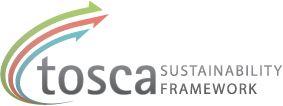Keyword: Management tools (9)
AkzoNobel: Eco-premium solutions
By Eco-premium solutions (EPS) is a quick scan method to qualitatively assess the performance of an AkzoNobel product compared to the performance of the competing mainstream products in a life cycle perspective, in terms of six HSE aspects (Health, Safety and Environment). The objective is to develop more sustainable products and to be able to […]
Eco-efficiency Assessment (EEA)
By When comparing new products with competing products on the market, environmental as well as economical aspects are necessary in order to evaluate the market acceptance of the new products and the possibility to gain market shares. Also, in order to know where to put efforts and resources to acheive the most environmental gain, it is […]
Some definitions of Eco-efficiency
By 1. ISO/DIS 14045 The ISO/DIS 14045 declares: “Eco-efficiency is a quantitative management tool that enables the consideration of life cycle environmental impacts of a product system alongside its product system value to a stakeholder”. The draft standard defines eco-efficiency as “an aspect of sustainability relating the environmental performance of a product system to its […]
Eco-efficiency
By In this Getting Started Guide we will introduce the concept of Eco-efficiency and the methodology of Eco-efficiency assessment and guide you to different uses of it. What is Eco-efficiency? Eco-efficiency is a management philosophy which encourages business to search for environmental improvements that yield parallel economic benefits. The objective is to become more efficient […]
More information on Eco-efficiency
Here are some links to further reading about Eco-efficiency and assessment World Business Council for Sustainable Development (WBCSD). European Environment Agency (EEA)
Further reading: Stage-Gate® model
Many sustainability concerns, such as energy and resource efficiency as well as waste minimization, are also economic issues. Environmental considerations early in the product development process could offer more competitive and sustainable products to the market and avoid having to correct potential environmental problems after the product has been launched. Sustainability requirements and aspects should […]
Eco-efficiency methodology
By An EEA assesses the ecological impact and financial structure of competing products, processes or services delivering the same customer benefit, and identifies the best alternative. It includes all steps along the life cycle. The general procedure for carrying out EEA is presented in figure 1. The eco-efficiency methodology is based on a combination of […]
Environmental management systems at SCA facilities for personal care products
By Environmental management systems according to ISO 14001 are implemented at SCA manufacturing facilities to secure structured and systematic work with environmental issues within the facilities. The work with implementing and maintaining the environmental management systems is run by each production facility. All facilities for personal care products in Europe have a QRESH coordinator, with responsibility […]
Uses of Eco-efficiency in business
By Eco-efficiency has become a widely used management concept among large companies worldwide. The reason for this can be as Kuosmanen states: Many policy makers, business managers, and consumers are keen to make environmentally friendly decisions, but they simply lack the necessary information resources to compare different alternatives. …. The function of Eco-Efficiency measures is […]

